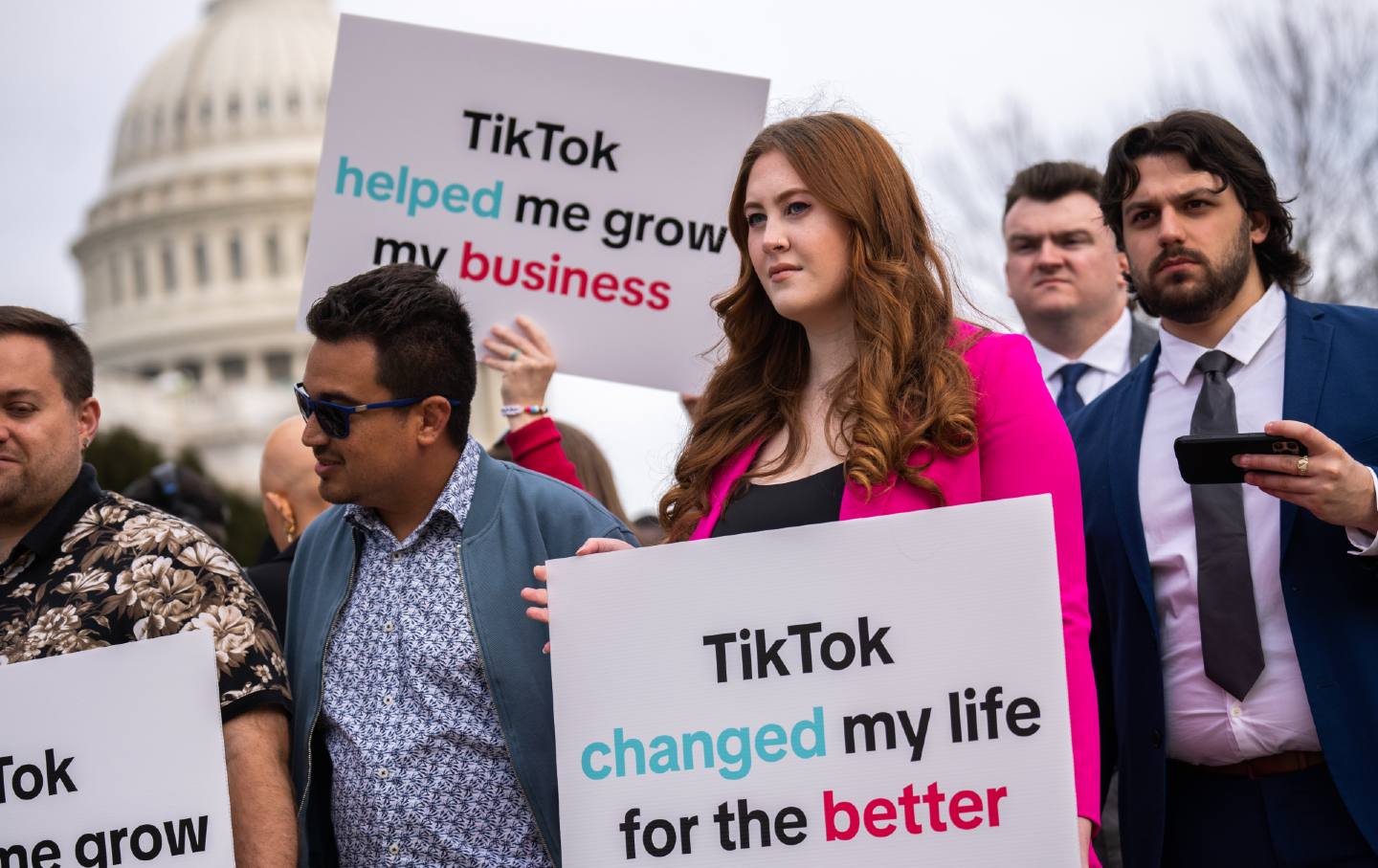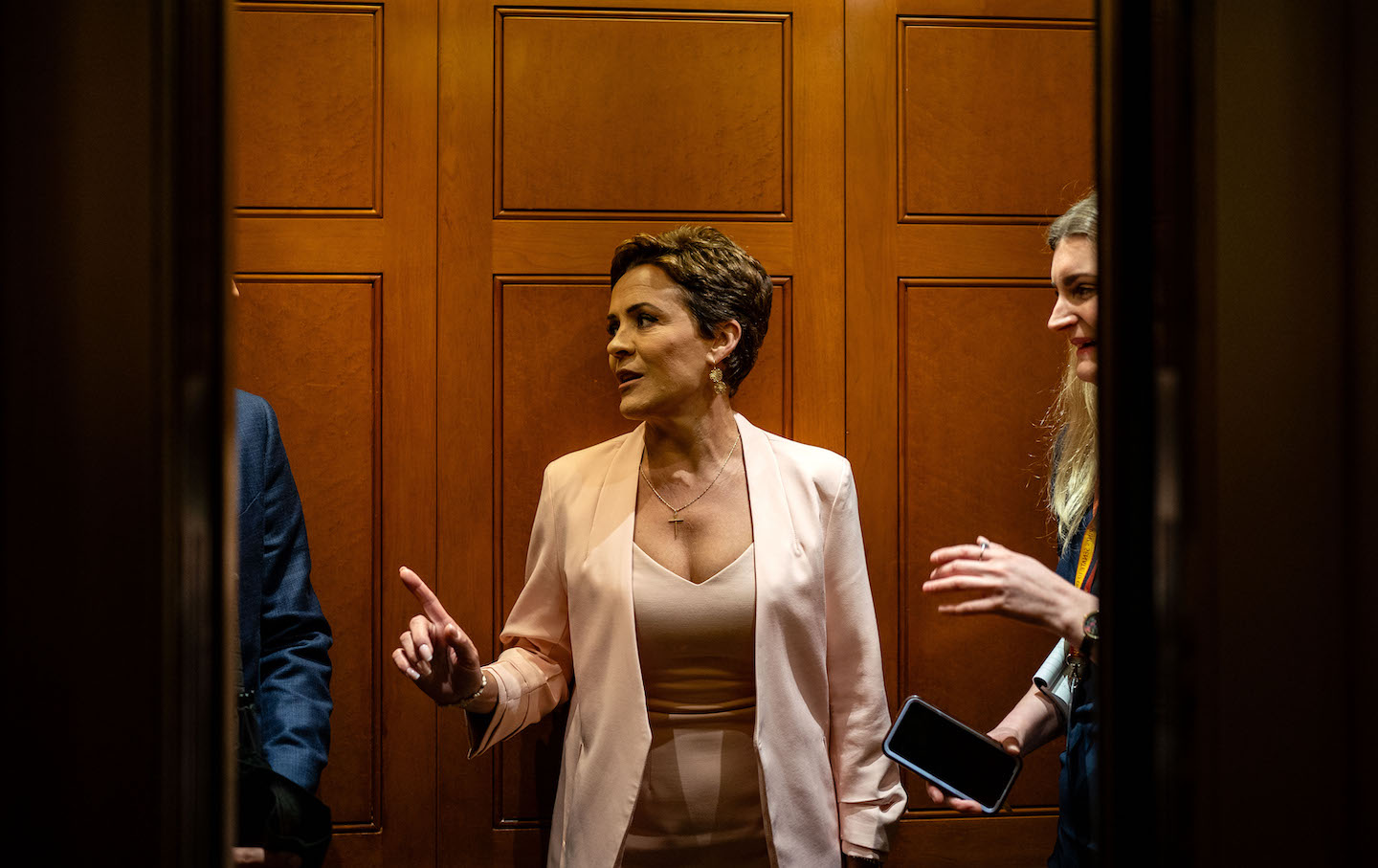Loath as I Am to Agree With Marjorie Taylor Greene…
How the effort to bank TikTok is a fascinating case study in transpartisan politics.

Earlier this month, millions of young Americans opened TikTok on their phones and were faced with a startling message: “Stop a TikTok shutdown,” it read. “Speak up now—before your government strips 170 million Americans of their Constitutional right to free expression.” A bright red “call now” button appeared at the bottom of the screen.
This rare call for direct action came in response to the Protecting Americans from Foreign Adversary Controlled Applications Act—a bill that would prevent any online application that is controlled by a “foreign adversary” from being hosted in the United States, unless said app is divested from said adversary. (In this case, America’s foreign adversaries are defined as China, Russia, Iran, and North Korea.) And just in case that was too subtle, it explicitly names TikTok as needing to be divested from its Chinese parent company, ByteDance.
While the bill overwhelmingly passed in the House 352-65, the members in opposition don’t fall neatly along party lines. The list includes progressive Democrats and Freedom Caucus Republicans who have come to the same conclusion, albeit from different presuppositions.
The effort to ban TikTok—and the backlash that has followed—has been a fascinating case study in transpartisan politics. Prominent figures on both sides of the aisle have cited a wide range of concerns, including data privacy, national security, freedom of speech—and, perhaps most saliently this election year, the transformative effect the bill could have on presidential power.
Advocates for the bill have insisted that it is not technically a ban—that TikTok could continue to be used in the United States so long as ByteDance sells it within six months of the law’s enactment. But that appears to be a nonstarter, as both ByteDance and China are highly unlikely to cooperate with such a requirement. All signs indicate that a signature from President Biden would result in the app’s disappearance in the United States.
What could be even more impactful than the non-ban ban, though, is the way it is enforced. The bill applies to any website or application with over a million monthly visitors that allows users to create accounts and share content. If it has so much as a comments section, it counts. No one is even sure how many apps the bill could ban as soon as it gets signed.
That would be up to the White House. The bill gives the president the authority to determine whether an app controlled by a foreign adversary poses a “significant threat to the national security of the United States.” It also requires him to approve its sale, which means that even if a given tech company tried to cooperate, he could stonewall indefinitely to effectively ban the app anyway.
Then there’s the vagueness of what constitutes “control” by a foreign adversary. The bill leaves that up to interpretation too. The company doesn’t even have to be based in a foreign adversary country to have its apps banned—it just has to be “subject to the direction or control” of someone who is.
As one technology lawyer put it: “The President really has the unchecked power to put another app on this list.”
The bill’s opponents include Democratic representatives like Ro Khanna, who represents Silicon Valley and would rather protect data privacy with a more “narrowly tailored law.” Jamaal Bowman thinks the bill is driven by “xenophobic anti-China rhetoric,” while Alexandria Ocasio-Cortez wants information about the alleged security risks to be made public. “This is putting the cart before the horse,” she said, on TikTok.
Meanwhile, on the other side of the aisle, Nancy Mace thinks it is “not the role of government to ban apps from the app store.” Matt Gaetz says the bill is “rushed” and “overbroad.” Marjorie Taylor Greene worries it would “open Pandora’s box” and lead to more censorship down the line.
Loath as I am to agree with Marjorie Taylor Greene, giving the president near-unilateral authority to ban free-speech platforms could very well backfire—especially if that president is Donald Trump. Imagine handing that kind of power to the man who recently called Facebook an “enemy of the people,” who is known for harboring personal vendettas, and who owns a competing social media platform of his own. What could go wrong?
Popular
“swipe left below to view more authors”Swipe →The concerns about TikTok are genuine, but so are the concerns of those opposing the bill. It would be more responsible—and more effective—to regulate how the company collects and uses Americans’ personal data. Last week, the Department of Justice sued to regulate Apple; the same could be done with TikTok.
Regulation would help curb misinformation, which spreads like wildfire on the app. It would also—as opposed to an outright ban—prevent backlash among young voters ahead of a close election. And it won’t set a precedent of unchecked executive power, so Trump can’t ban Twitch because he thinks its owner’s business interests in China count as foreign control.
One hundred and seventy million Americans use TikTok. That’s more than half the population, including one-third of adults and almost two-thirds of people under 30. Regulatory action would make the app safer to use, without banning one of the country’s most popular social media platforms—and angering most of the country in the process.
Thank you for reading The Nation!
We hope you enjoyed the story you just read. It’s just one of many examples of incisive, deeply-reported journalism we publish—journalism that shifts the needle on important issues, uncovers malfeasance and corruption, and uplifts voices and perspectives that often go unheard in mainstream media. For nearly 160 years, The Nation has spoken truth to power and shone a light on issues that would otherwise be swept under the rug.
In a critical election year as well as a time of media austerity, independent journalism needs your continued support. The best way to do this is with a recurring donation. This month, we are asking readers like you who value truth and democracy to step up and support The Nation with a monthly contribution. We call these monthly donors Sustainers, a small but mighty group of supporters who ensure our team of writers, editors, and fact-checkers have the resources they need to report on breaking news, investigative feature stories that often take weeks or months to report, and much more.
There’s a lot to talk about in the coming months, from the presidential election and Supreme Court battles to the fight for bodily autonomy. We’ll cover all these issues and more, but this is only made possible with support from sustaining donors. Donate today—any amount you can spare each month is appreciated, even just the price of a cup of coffee.
The Nation does not bow to the interests of a corporate owner or advertisers—we answer only to readers like you who make our work possible. Set up a recurring donation today and ensure we can continue to hold the powerful accountable.
Thank you for your generosity.
More from The Nation

Republicans Are in Damage Control Mode Over Abortion Republicans Are in Damage Control Mode Over Abortion
Arizona’s 1864 abortion law has local party leaders flailing to avoid alienating voters.

Pecker Exposes Lengths Taken to Please Trump Pecker Exposes Lengths Taken to Please Trump
Testimony by the former National Enquirer publisher detailed the Trump campaign’s involvement in directing the tabloid's coverage of the 2016 election.

Summer Lee Proves That “Opposing Genocide Is Good Politics and Good Policy” Summer Lee Proves That “Opposing Genocide Is Good Politics and Good Policy”
Last week, the Pennsylvania representative voted against unconditional military aid for Israel. This week, she won what was supposed to be a tough primary by an overwhelming margi...

Without Expanded DACA Protections, Undocumented Students Are Being Left Behind Without Expanded DACA Protections, Undocumented Students Are Being Left Behind
Around 80 percent of the nearly 120,000 undocumented students who graduated high school in 2023 don’t qualify for DACA.

Here’s What a 21st-Century Rural New Deal Looks Like Here’s What a 21st-Century Rural New Deal Looks Like
A strategy for building a rural-urban working-class coalition.

The House Foreign Aid Bills Have Put a Target on Mike Johnson’s Back The House Foreign Aid Bills Have Put a Target on Mike Johnson’s Back
After a vote in favor of sending $95 billion to Ukraine, Israel, and Taiwan passed, far right Republicans are threatening a motion to vacate the speaker of the house.


